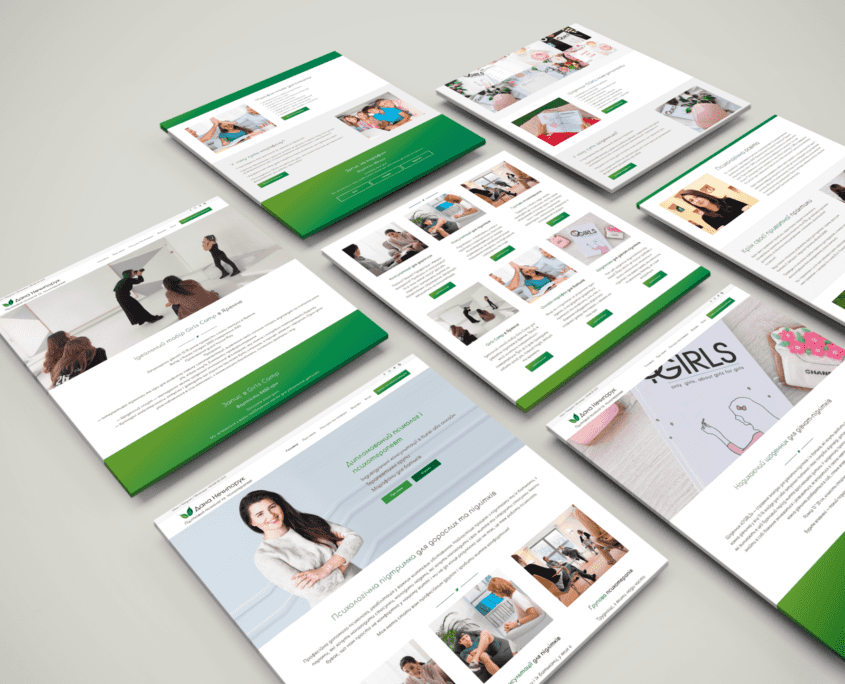Creating a Turnkey Website for a Psychotherapist
Testimonial:
“Elena is an excellent specialist. I ordered a website, and she helped me come up with the style, consulted on the website content and which options were necessary, and developed the technical configuration. Everything was done very quickly. All my wishes and edits were implemented the same day. She showed how everything works and provided technical support. Working with her was easy and simple. I will continue to collaborate with her. Highly recommended!”
– Dana Nechyporuk
Website Development for a Psychotherapist: Full Process and Key Aspects
Introduction
Creating a professional website for a private psychotherapist is a strategically important step in growing the business. In the digital age, a high-quality website helps not only to attract new clients but also to interact effectively with existing patients. This text provides a detailed overview of the entire website development process for a psychotherapist, from initial research to final evaluation of results.
Goals and Objectives of Psychotherapist Website Development
Attracting New Clients
The primary goal of creating a psychotherapist website is to attract new clients. To achieve this, the website must be search engine optimized (SEO), including the use of keywords such as “psychotherapist,” “psychological help,” “psychotherapy services,” and LSI terms like “psychotherapist consultations” and “therapy methods.” SEO helps improve the site’s visibility in search engines and reach the target audience.
Providing Information
It is important to provide comprehensive information about the services offered. The website should include detailed descriptions of therapy methods, information on the psychotherapist’s qualifications and experience, as well as answers to frequently asked questions. This informational support helps potential clients better understand the services and how they can benefit from them.
Usability
Website usability is a key aspect of its success. The site should have intuitive navigation, easy access to key sections, and fast page load times. A well-designed interface helps users find the information they need quickly and interact with the site without frustration.
Client Interaction
Integrating appointment booking and feedback forms is an essential part of the website. These features simplify interaction with clients, allowing them to easily schedule consultations and quickly get answers to their questions.
Stages of Psychotherapist Website Development
1. Research and Planning
Target Audience and Competitor Analysis
The first stage includes a deep analysis of the target audience and competitors. This helps identify the most in-demand features and design elements. Competitor analysis reveals best practices and determines which features will help the website stand out.
Keyword Research
Conducting keyword research helps identify the most relevant phrases that users may use to find psychotherapist services. This includes primary keywords (e.g., “psychotherapist,” “psychological help”) and LSI keywords (e.g., “therapy for depression,” “consultations with a psychotherapist”).
2. Design
Wireframes and Mockups
The second stage involves creating wireframes and page mockups. The design should be clean and minimalistic, using calm and trustworthy color schemes, and ensuring information is easy to digest.
Key Design Elements
- Clean and minimalistic: avoid overloading pages with unnecessary elements.
- Calm color schemes: use soft, neutral colors to create a trustworthy atmosphere.
- Ease of perception: organize information logically, use clear fonts, and maintain enough spacing between elements.
3. Development
Responsive Design
The development stage includes creating a responsive design that displays correctly on all device types. Technologies used include HTML5 and CSS3 for structure and styles, JavaScript for interactive elements, and WordPress as the content management system.
Main Technologies
- HTML5 & CSS3: for creating website structure and styles.
- JavaScript: for interactive elements, such as animations and forms.
- WordPress: for easy content management and administration.
4. Content
Creating Quality Content
Content should be developed in close collaboration with the psychotherapist and accurately reflect their work. Essential content includes:
- Service and therapy descriptions: detailed explanation of therapy approaches and services.
- Biography and qualifications: information on professional experience and credentials.
- Helpful articles and resources: publications, tips, and advice for clients.
5. Testing and Launch
Debugging and Verification
After development, the website should be thoroughly tested across devices and browsers. This ensures all elements function correctly and errors are resolved.
Key Testing Aspects
- Browser compatibility check (Chrome, Firefox, Safari, etc.).
- Responsive testing on different devices (smartphones, tablets, PCs).
- Page load speed check and image optimization.
Results and Performance Evaluation
Main Results
The completed website should fully meet the set objectives, including:
- Easy navigation and structure: users quickly find needed information.
- Intuitive interface: simplifies website usage.
- Fast page load speed: prevents visitor loss due to slow loading.
- Effective appointment and contact forms: streamline client interaction.
- Mobile responsiveness: ensures correct display on all devices.
Conclusion
Developing a website for a psychotherapist is a complex and multi-faceted process that requires attention to detail and a deep understanding of the specialist’s work. A high-quality website that considers all the aspects above helps successfully attract new clients and ensures smooth interaction with existing patients. Positive reviews and increased appointment bookings confirm the project’s success and effectiveness.
Creating a professional website is an investment in the future of your business, helping expand your client base and improve service quality.
Contact Information
If you are interested in this project or want to discuss website development for your business, feel free to contact me. I will be happy to help bring your ideas to life.
Get in touch
Contacts
Tel./WhatsApp:
+34 656 96 13 11 (Spain)
WhatsApp/Viber:
+38 096 928 51 65 (Ukraine)
Telegram:
t.me/+34656961311
Social media:
Instagram: @web_seo_ppc
Facebook: @web_seo_ppc
Offices
03183 Spain, Alicante
Torrevieja, Calle La Sal, 25
08132 Ukraine, Kyiv
3, O. Dovzhenko St.
E-mail:
info@web-seo-ppc.com
Working hours:
Mon–Fri: 9:00 — 20:00
Sat–Sun: 9:00 — 16:00




